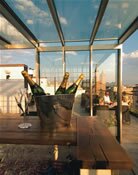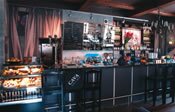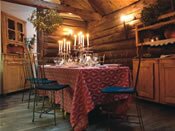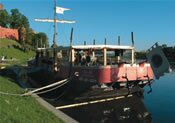Inflight Magazine of Brussels Airlines
Welcome to the Inflight Magazine of Brussels Airlines
Luxe for less
 A new breed of entrepreneurs are simultaneously reviving Krakow’s stylish heritage and setting the standard for New Age luxury, which the credit crunch is making more accessible than ever, says Anna J. Kutor
A new breed of entrepreneurs are simultaneously reviving Krakow’s stylish heritage and setting the standard for New Age luxury, which the credit crunch is making more accessible than ever, says Anna J. Kutor
Once upon a time, when Poland was Europe’s most powerful kingdom, Krakow sparkled with regal splendour. Today, glitz and glamour still reign strong, especially amongst a group of private investors who are refashioning frayed and forgotten mansions into refined restaurants and luxurious hotels.
Paula Łodzinska, the creative force behind restaurants Cherubino, Galar Pod Aniołami and Cava Cafe & Wine is one such investor. Protecting Krakow’s heritage through commercial development is part of her manifesto.
“Authenticity, tradition, and a sense of soul have to be harmonised with the highest level of services to achieve luxury status and long-lasting success,”
She represents the fourth generation of the staggeringly entrepreneurial Łodzinski clan that have shaped Krakow’s’ culinary culture for over a century. Jacek Lodzinski, the patriarch of the family, began reclaiming ancestral properties in the early ‘90s and invested heavily in establishing a slew of suave stores, restaurants and artistic outlets. These included Café Camelot and the Pod Aniołami, a rustic underground retreat.
 “Celebrating our national identity and cultural roots gives us the competitive edge over fad-focused establishments,” says Łodzinska.
“Celebrating our national identity and cultural roots gives us the competitive edge over fad-focused establishments,” says Łodzinska.
Also championing historic preservation efforts is Jerzy Donimirski, an architect and businessman who runs a small chain of high-end boutique hotels converted from palaces and landmark buildings in Krakow. Donimirski’s inaugural project, Hotel Maltanski, resurrected the shell of a 19th-century town house in 2000. It was followed by Hotel Pugetów in 2003, which emerged on the prominent Pugetów Palace grounds. Then came the ancient fortification-turned-flamboyant four-star Hotel Gródek, which opened in 2005 after 10 years’ worth of renovations. The building works were primarily financed by a €1.5 million loan from BPH Bank, with each of the 23 rooms costing between €39,000 and €47,000 to refurbish. And this year saw the completion of Hotel Kosciuszko, a property of exquisite beauty that gave a new lease of life to a three-storey, 1200m² manor house on the outskirts of town.
Liwa Holding, a business partnership between brothers Tadeusz, Wiesław and Leszek Likus, espouses a similar commitment to conserving the best of the past for the future. The industrious trio amassed a fortune investing in breweries and tobacco factories throughout Poland, and in 1997, they turned the near-derelict Hotel Pod Róza, Krakow’s oldest operating accommodation, into a 57-room, four-star luxury boutique hotel. It took a multi-million-euro investment to renovate the crumbling Hotel Copernicus, a Renaissance-style building at the base of the Wawel Hill. Since its reopening in 2000, the hotel has garnered a reputation for decadence, and has hosted the likes of George W. Bush, Saudi Princess Reem Al-Faisal and Prince Charles. It has also netted the 2008 World Travel Awards for Poland’s Leading Hotel, topped Polish Forbes’ 100 Best Hotels list in 2008, and earned a Michelin Guide recommendation for its restaurant.
 The youngest scion of the family, 46-year-old Leszek, holds the design and implementation reins of the business. Apart from the lavish Likus hotels, his style can be seen in the Likus Concept Store, an upscale shopping arcade converted from a downtown tenement house in 2005. Modelled after trendsetting retail venues in New York and Milan, it brings boutiques like Gianfranco Ferre, Martin Margiela and Diesel Denim Gallery together under one roof. The venue even has an upmarket Italian delicatessen and a wine store beneath the network of vaulted gothic ceilings. This mushrooming of new high-end hotels and leisure landmarks has delivered significant economic benefit to the local tourism sector, luring boutique and business travellers who previously sidestepped Krakow in favour of more luxe destinations.
The youngest scion of the family, 46-year-old Leszek, holds the design and implementation reins of the business. Apart from the lavish Likus hotels, his style can be seen in the Likus Concept Store, an upscale shopping arcade converted from a downtown tenement house in 2005. Modelled after trendsetting retail venues in New York and Milan, it brings boutiques like Gianfranco Ferre, Martin Margiela and Diesel Denim Gallery together under one roof. The venue even has an upmarket Italian delicatessen and a wine store beneath the network of vaulted gothic ceilings. This mushrooming of new high-end hotels and leisure landmarks has delivered significant economic benefit to the local tourism sector, luring boutique and business travellers who previously sidestepped Krakow in favour of more luxe destinations.
The proof lies at least partially in increases in tourism arrivals. Between 2004 and 2007, the number of holidaymakers to Krakow jumped from 6.4 million to over 8 million – a 25% surge. According to reports issued by the Małopolska Tourist Organisation, revenue from tourism rose from €610m to €750m. The turmoil in global financial markets and forecasts of economic stagnation, however, show darker clouds on the horizon. Tomasz Frankowski, the general manager of Hotel Stary (the latest addition of the Likus Enterprise) has already noticed a 20% decrease in reservations over last year. According to him, this is largely due to the negative exchange rate of euro versus the dollar to zloty.
Frankowski fears that “this is just the beginning,” concerns that are echoed by Elzbieta Nazarewicz, the business development manager of Escape to Cracow, an independent tour operator offering luxury B2B services in Krakow.
 Also facing an imminent fall in earnings, Nazarewicz is reacting by lowering the pricing on her tours by almost 10%, and at the same time increasing the luxury component (vouchers to high-end restaurants, giving guests their own personalised travel guides), ostensibly banking on the sustainability of the market for luxury travel and tourism.
Also facing an imminent fall in earnings, Nazarewicz is reacting by lowering the pricing on her tours by almost 10%, and at the same time increasing the luxury component (vouchers to high-end restaurants, giving guests their own personalised travel guides), ostensibly banking on the sustainability of the market for luxury travel and tourism.
“There will always be clients demanding the highest quality so now Krakow needs to turn from quantity towards quality by developing its luxury branch with stellar services such as helicopter flights, luxury cars and exclusive body treatments” she explains.
Thanks to Krakow’s club of cultural-heritage entrepreneurs, much of the luxury tourism infrastructure has been implemented. And the good news is, it has never been more affordable.
FR Luxe à prix limité
Des investisseurs font revivre le fabuleux patrimoine historique de Cracovie tout en instaurant simultanément, les standards d’un Nouvel Âge du luxe. Et à cette époque critique de crise financière, ces infrastructures sont plus accessibles que jamais, comme nous l’explique Anna J. Kutor
Un groupe d’investisseurs privés est en train de relooker les demeures défraîchies de Cracovie pour les transformer en restaurants haut de gamme et en hôtels de luxe. Paula Łodzinska gère des restaurants comme Cherubino, Galar Pod Aniołami et Cava Cafe & Wine. La protection du patrimoine architectural de Cracovie par le biais du développement commercial fait partie de son credo.
“L’authenticité, la tradition, et l’âme des lieux doivent entrer en harmonie avec le plus haut niveau de services, pour atteindre au luxe et réussir dans une perspective de durée,” confie-t-elle.
Elle fait partie du clan Łodzinski qui a façonné la culture culinaire de Cracovie depuis plus d’un siècle. Jacek Łodzinski a commencé à restaurer des propriétés ancestrales dans les années 90 et à investir massivement dans des boutiques et des restaurants.
De son côté, Jerzy Donimirski est un champion de la préservation de l’héritage historique. Cet architecte qui gère une petite chaîne de somptueux hôtels boutiques (voyez l’Hôtel MaltaÐski, l’Hôtel Pugetów, l’Hôtel Gródek et l’Hôtel Kosciuszko, pour commencer), convertis en palaces et en lieux de références à Cracovie.
Liwa Holdings tente de préserver les meilleurs aspects du passé pour le futur. En 1997, ils ont transformé le vétuste Hôtel Pod Róza en un établissement quatre étoiles. La rénovation de l’Hôtel Copernicus a coûté quelques millions d’euros mais depuis sa réouverture en 2000, il a hébergé des hôtes de marque comme George Bush et le Prince Charles, remportant le World Travel Awards 2008 des plus grands Hôtels de Pologne.
En termes économiques, cette prolifération de hauts-lieux sophistiqués a engrangé de conséquents bénéfices. Entre 2004 et 2007, le nombre de touristes a grimpé de 25%. Le revenu du tourisme a augmenté de €610m à €750m. Mais l’on ressent déjà les premiers effets de la récession économique.
Directrice du développement chez Escape, à Cracovie, Elzbieta Nazarewicz baisse le prix des circuits touristiques, et augmente celui des composants plus luxueux. Easy, structure connexe de l’infrastructure du tourisme du luxe est opérationnelle. La bonne nouvelle? Cela n’a jamais été aussi abordable.
NL Voordelige luxe
Investeerders blazen het stijlvolle erfgoed van Krakau nieuw leven in en bepalen meteen de standaard voor New Age luxe, wat als gevolg van de kredietcrisis toegankelijker is dan ooit, zegt Anna J. Kutor
Een groep privé-investeerders zijn druk in de weer om de verouderde historische herenhuizen van Krakau om te bouwen tot verfijnde restaurants en luxehotels. Paula Łodzinska baat restaurants uit zoals Cherubino, Galar Pod Aniołami en Cava Cafe & Wine. Kraukau’s erfgoed beschermen door het commercieel uit te bouwen, behoort tot haar opzet.
“Authenticiteit, traditie en een zekere ziel moeten worden geharmoniseerd met dienstverlening van het allerhoogste niveau om een luxestatus en succes op lange termijn te bewerkstelligen”, zegt ze.
Ze maakt deel uit van de Łodzinski-clan die de culinaire cultuur van Krakau al meer dan een eeuw lang vormgeeft. Jacek Łodzinski begon in de jaren ’90 eigendommen van zijn voorouders terug te vorderen en investeerde intensief in handelszaken en restaurants.
Ook Jerzy Donimirski, een architect, neemt initiatieven voor het historisch behoud van erfgoed in de stad: hij heeft een aantal paleizen en historische gebouwen verbouwd zodat hij nu aan het hoofd staat van een bescheiden keten van luxeboetiekhotels (o.a. Hotel Maltanski, Hotel Pugetów, Hotel Gródek en Hotel Kosciuszko).
Liwa Holdings probeert het beste van het verleden te beschermen voor de toekomst. In 1997 toverden ze het zo goed als vervallen Hotel Pod Róza om tot een viersterrenhotel. Een investering van talloze miljoenen euro was nodig om het Hotel Copernicus te renoveren. Sinds de opening in 2000 hebben voorname gasten als George Bush en Prince Charles er gelogeerd en heeft het de World Travel Award 2008 voor Nummer Eén hotel van Polen in de wacht gesleept.
De snelle ontwikkeling van eersteklas attracties heeft de stad geen windeieren gelegd. Tussen 2004 en 2007 werden er 25% meer toeristen genoteerd. De inkomsten via toerisme stegen van € 610 miljoen naar € 750 miljoen. Maar de economische malaise heeft ook negatieve gevolgen.
Elzbieta Nazarewicz, business development manager van Escape to Cracow, verlaagt haar prijzen voor rondritten en verhoogt het luxeaanbod. Makkelijk, aangezien de stad heel wat luxueuze toeristische infrastructuur bezit. Het goede nieuws? Het is nooit eerder zo betaalbaar geweest.
Leave a Reply
